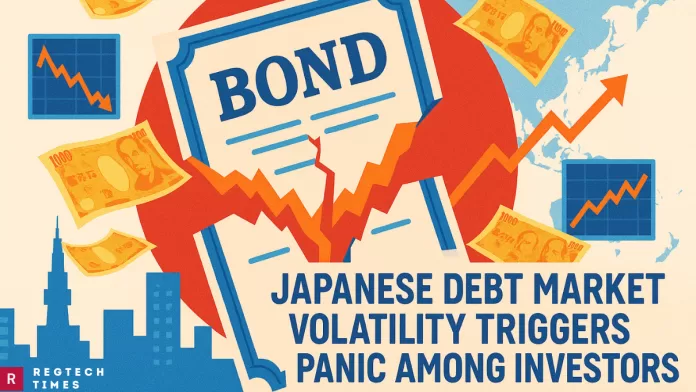For many years, Japanese bond market was very quiet. It was like a calm lake—barely moving. The Bank of Japan, which is the country’s central bank, used to control how much interest the government paid when borrowing money. This helped keep things very stable. But now, that control is mostly gone. And with it, peace in the market has disappeared.
Japan has a very large bond market worth around $7.8 trillion. Governments can borrow funds from investors through bonds. Japanese investors used to be comfortable lending money to the government at very low interest rates. But recently, interest rates on very long-term bonds (those that last 20 or 30 years) have jumped sharply. This jump is causing big price swings—called volatility—in the market.
One reason for this chaos is that investors are now asking for higher returns to lend money for such long periods. They worry about huge government debt and inflation. With fewer people wanting to buy these long bonds, the prices fall and the interest rates go up. In May, a government auction for 20-year bonds didn’t go well, and that pushed rates up even more. These sudden changes are not normal for usually slow-moving bond market.
How Japan’s Market Is Affecting the Rest of the World
When Japan’s bond market shakes, other countries feel the tremors. This is because Japan is one of the biggest lenders to the world, especially the United States. Japanese investors hold a huge amount of U.S. government debt. When Japan’s bond yields go up, it makes American and European bonds look less attractive. This causes investors to sell those bonds too, creating more ups and downs in global markets.
Japan’s $6.3 Billion Move to Protect Economy from U.S. Tariffs
In recent weeks, there’s been a strong connection between Japanese bond rates and bond rates in countries like the United States and the United Kingdom. For example, when the interest on Japan’s 30-year bond spiked, similar long-term bonds in the U.S. and Germany also saw sharp increases. This shows that movements in Japan are closely linked to what happens in other major economies.
One key reason for this is the time zones. Japan’s markets open before Europe and the U.S. So when bond prices start moving early in Tokyo, it sends a signal to traders in London and New York. A ripple effect spreads across the globe. This chain reaction has already caused global bond investors to lose money for the first time this year.
Bigger Changes Inside Japan Shake Confidence
Another big reason for the current mess is that the Bank of Japan has started pulling back from buying government bonds. For years, the central bank was the biggest buyer, owning more than half of all the bonds. This helped keep demand strong and prices stable. But now the Bank is buying less and letting some of its older bonds expire without replacing them.
In the first three months of this year alone, the Bank of Japan’s bond holdings dropped by a record ¥6.18 trillion (about $43 billion). This is the largest decline since 1996. Without the Bank stepping in, the bond market is having to stand on its own—and it’s not going smoothly.
German Bonds No Longer Sacred? Japan’s $18B Bond Sell Signals Deep Doubts in Western Economies
At the same time, Japan’s government is planning to change how it sells bonds. There are talks about selling more short-term bonds and fewer long-term ones. This is because the longer-term bonds are seeing the most volatility. Investors are showing less interest in long bonds and more in short ones, hoping to avoid the risks of inflation and rising interest rates.
Also, Japanese government bonds have a big role in international investment portfolios. In one major global bond index, Japan makes up nearly 17%. That means when Japanese bonds fall in value, investors around the world feel the losses too. Big funds that track these indexes automatically lose money when the Japanese bond market dips.
Overall, Japan’s bond market, once sleepy and stable, is now full of sudden shocks. This shift is not only shaking Japanese investors but also creating waves that stretch all the way to Europe and America. With the Bank of Japan stepping back and long-term bonds falling out of favor, global markets are facing a new source of uncertainty—and everyone is watching closely.
